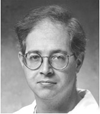 "Hours of boredom, moments of terror" What a load of bullshit. Anesthesia only
seems boring to people who believe that if you are not constantly
fiddling with instruments, you can't be doing anything meaningful. (do
we know anybody like that?) Moments of terror? I guess that refers to
the feeling of loss of control you might have when you realize that the
problem at hand (i.e. airway) is something that you don't know a thing
about, and so you have to rely on (and trust) the skill and competence
of your colleague while you stand by and watch.
"Hours of boredom, moments of terror" What a load of bullshit. Anesthesia only
seems boring to people who believe that if you are not constantly
fiddling with instruments, you can't be doing anything meaningful. (do
we know anybody like that?) Moments of terror? I guess that refers to
the feeling of loss of control you might have when you realize that the
problem at hand (i.e. airway) is something that you don't know a thing
about, and so you have to rely on (and trust) the skill and competence
of your colleague while you stand by and watch.
You know you are just "passing gas" when:
-you don't know the difference between an ACE inhibitor and an ARB.
-when somebody calls the ether screen the "blood brain barrier," you don't get it.
-you can't list the drugs that predispose to torsades in a patient with a long QTC (or you don't know your current patient's QTC!)
-you're not as comfortable with a flexible fiberscope as a direct laryngoscope.
-you don't know what "open lung concept" ventilation is.
-you don't look at the heart while coming off bypass.
-you cancel patients for "cardiac clearance" (Egads!)
-you didn't auscultate for undiagnosed aortic stenosis before you induced.
You're just "passing gas:"
-if you didn't set your alarms.
-if you don't know which nerve roots form the phrenic nerves.
-if you can't conduct a resuscitation "by the book" and you don't know when it's appropriate to "throw the book out"
-If you don't know that the most important member of the surgical team is... everybody, because if the $12/hour person in sterile processing doesn't get it right, the whole thing is a disaster...
-if you can't clearly articulate what differentiates you from a CRNA, and why it matters.
I could go on forever...feel free to chime in; I'll compile them all and re-post the complete list sometime...
 Mitch Keamy is an anesthesiologist in Las Vegas Nevada
Mitch Keamy is an anesthesiologist in Las Vegas Nevada
 Andy Kofke is a Professor of Neuro-anesthesiology and Critical Care at the University of Pennslvania
Andy Kofke is a Professor of Neuro-anesthesiology and Critical Care at the University of Pennslvania
 Mike O'Connor is Professor of Anesthesiology and Critical Care at the University of Chicago
Mike O'Connor is Professor of Anesthesiology and Critical Care at the University of Chicago
 Rob Dean is a cardiac anesthesiologist in Grand Rapids Michigan, with extensive experience in O.R. administration.
Rob Dean is a cardiac anesthesiologist in Grand Rapids Michigan, with extensive experience in O.R. administration.

What does differentiate you from a CRNA and why does it matter---gaspasser
Posted by: rlewis | April 06, 2024 at 01:28 AM
Simply put, an anesthesiologist is a physician. A CRNA is a nurse. Why should this matter? Parenthetically, do we ever ask why a surgeon has to be a physician? Why not have nurses or techs do surgery?
But back to the question, which now becomes, why should an MD give anesthetics. Well, sometimes, it's not necessary, I suppose. A simple hernia or gall bladder. As long as there are no medical complications. Just like probably a nurse could do an appendix. Just like pharmacists's mates did them on subs in WW II in movies. If it goes well, no problem. Patients whose cases are complicated by medical diseases (coronary artery disease, sickle cell anemia, diabetes, etc, etc) benefit from having a physician versed in the underlying disease process and how it impacts on the surgery and anesthetic. How about Monkberg's cystic medial necrosis in a patient underging cerebral artery aneurysm clipping? (saw one.) As I said in my post "We have met the Enemy and He is us," I have no difficulty with the care team model.I like CRNA's. It leverages the knowledge of the anesthesiologist across a wider area. But When things get ugly (which they can, unexpectedly) a diligent anesthesiologist is a good person to have around. I have no problems with CRNA's; they have a problem with me, because they don't like it that I think there is a difference between MD anesthesiologists and CRNA's. They want to be the same. But they are not. They are good, but they are not MDs. And sometimes (you can't always predict when) an MD is necessary.
Thanks
Posted by: mkeamy | April 07, 2024 at 08:07 AM
If you want to know the real difference between a CRNA and an anesthesiologist, look at anesthesioboists thoughtful posts on "informed consent, sign here please," and then go look at the CRNA forum www.nurse-anesthesia.org and look in the "passing gas forum" for "This is unreal you have to see it." You might want to take a look at versedbusters.blogspot.com too and see some of the posts there as well. You will have a well rounded view of Anesthesiologists, CRNA's and some very unhappy patients!
Posted by: jm | December 05, 2023 at 10:06 PM
I am a CRNA. I celebrate the RN in my credentials and have every awareness of what that perspective brings to the patients I serve. I always make it clear who I am and what the letters stand for.
I have worked most of my career (39 yrs) in the Anesthesia Care Team model. I have deep respect for the competent and knowledgeable Anesthesiologist and understand the importance of what a physician brings to the care of patients. I am so tired of the war waged on both sides of this battle which does nothing to promote better care for patients. There are good and bad nurse as well as physician anesthesia providers. The truth is that the public is served best when we each carry out our professional responsibilities with diligence and respect.
Posted by: Betty Wadland | March 18, 2024 at 09:16 AM